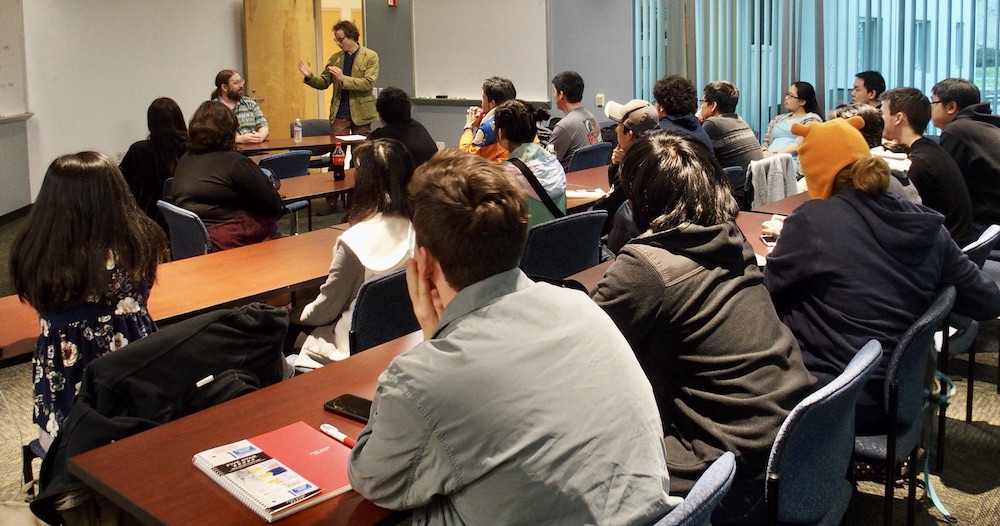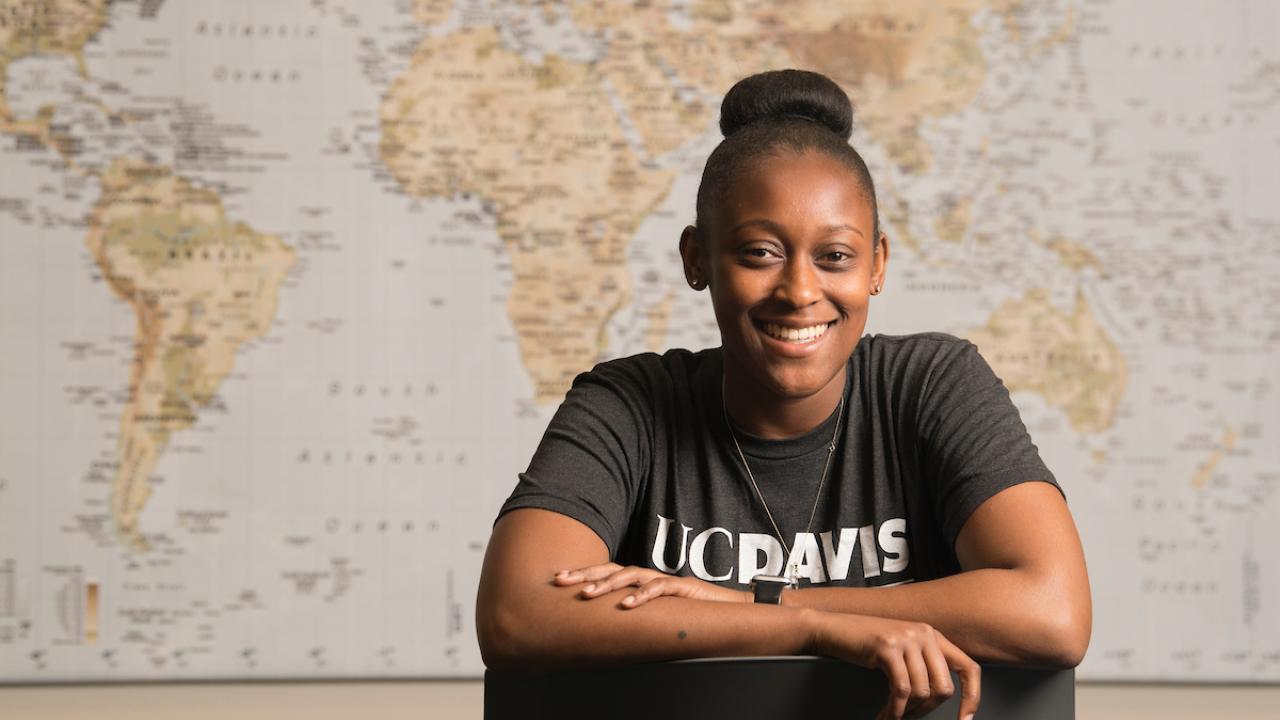As a French minor who struggles with the language, I often wonder: What will I do with this minor? If I’m not a French professor or an ambassador, is it still worth all the time? Then I remember how far I’ve come as a student and academic in the study of French: the confidence built, connections made, and perspective gained.
Language majors and minors often get overlooked, but their lessons are powerful in today's globalized world. Graduates of a language can work abroad and communicate across cultures. They learn more about our interconnected world and themselves. UC Davis offers more than 11 language majors or minors. The classes don’t just teach phonetics and grammar, but introduce students to the history, traditions, and intangible pieces of culture that make a nation and its people unique. You can learn about French Medieval Literature and how truly profane and vulgar the early French were. Or you can take Japanese Popular Culture, where students explore the world of anime and manga and teach the professor as much as they learn when they discuss new pop culture trends.
Though there are endless options, these majors and minors carry similar lessons. I spoke with five language professors and students, and they revealed how language degrees can help graduates in personal, academic, and professional life.
1. A language degree can help you in your professional career

It is not a secret that language courses are very time-consuming, especially if you have no prior background. Most entry-level classes require you to come to class four to five days a week, do heavy reading outside of class, and devote time to learning and relearning linguistic rules. Studying a language is really a commitment with no deadline, a skill you will be endlessly perfecting. So why make this commitment?
The study of language is “really vital not just for university coursework,” said Tobias Warner, an associate professor in the French and Italian department, “but for life skills like critical thinking, problem solving, effective practice [in] written and oral communication, and sensitivity to cultural differences.”
These skills make language majors and minors competitive candidates in the professional world who aren’t afraid to challenge themselves. “Each quarter I feel like I get pushed out of my comfort zone a little more,” said Kaylee Jansema, a third year history and anthropology double major and German minor. “Yeah it’s uncomfortable, and I don’t like it at first … but it does build that confidence and that strength in understanding I know what I’m doing.” High-level research papers, critical reading assignments, and formal presentations are regular components of language courses. Such assignments build key communication skills that prepare students for the demands of a globalizing world.
And students’ options are not limited to careers that center around language. These skills are applicable in many fields. Professor Warner lists several careers UC Davis French alums have pursued, including:
- Foreign language teacher
- Cardiologist
- Veterinarian
- Naval commander at the Pentagon
- Professor of political science
- Lawyer
- Nurse
- Translator
- Travel agent
- Financial manager
- Stock trader
- Industrial Attaché for the French Trade Commission
Many language students are double majors or have a major and minor. This allows language students to pursue many interests and develop strong comparative skills. Most use their language to aid in their other fields of study.
Learning a language can encourage you to gain perspective and think from different angles when looking at one problem. Sven-Erik Rose, an associate professor of German and comparative literature, describes how language majors and minors are “designed to be flexible and to encourage students to explore interdisciplinary connections… including art history, economics, film studies, history, and political science.”
2. You have a tightly knit community of students and professors

With so many different majors and minors, the language departments are diverse and inclusive communities. Students come with unique backgrounds and stories that brought them to study language. Some are natives speakers, while others simply decided to try something new.
Michelle Lester, a fourth year communication major, knew she wanted to study abroad — and when she secured a business internship in Tokyo, she was very excited. However, when the program was canceled due to the pandemic, she decided to prepare for the next year with Japanese courses. A second year of Covid meant Michelle was left without the opportunity to study abroad, but with a love for Japanese and a resulting minor. “I’m really glad I decided to do it,” Michelle reflected.
In many cases students meet friends that they would have never been introduced to if not taking a language class together. Michelle credited her Japanese minor for introducing her to her unexpected best friend, a twenty-four year old philosophy major. “I don’t know if I ever would have crossed paths with him otherwise,” Michelle said.
Classes are small in language departments. They range between 20 to 30 students in the lower division classes, but once you start taking upper division courses, you will be with 10 to 15 peers. This can seem very overwhelming, but it forces you to participate and really get to know your classmates and the professors! “Get to know your fellow students,” said Michael Foster, a professor of Japanese. “Community-building often comes from the language classes themselves. They’re so intense, they’re everyday, and students are doing pair work…so these really deep friendships cement, so don’t be afraid of that.” This academic support system eventually evolves into a professional network once students graduate from college.
There are many on-campus clubs that help you grow these connections and build bonds with classmates and professors. Michelle participated in “Kaiwa Hour,” a casual conversation hour every week on Fridays, where her and her classmates participated in fun activities like origami and karaoke. Kaylee attended Stammtisch, where German students practice the language while eating, watching a movie, or playing games. Finally, the campus offers many tutoring resources specific to language majors and minors to build an academic support system for students.
3. Language connects you to new people and places

Your language-learning community extends beyond campus. For many language majors and minors, learning continues when they study and intern abroad. UC Davis offers department-specific programs, university-specific programs, and programs that span the UC system, University of California Education Abroad Program (UCEAP).
“Studying abroad…could be really exciting and add a real dose of energy and exposure to lots of different kinds of learning and cultural differences, which are really important parts of any college education,” Professor Warner highlights.
Professors’ encouragement to study abroad often comes from personal experience. Professor Warner was a French major as an undergraduate, and he studied abroad in Dakar, Senegal. The opportunity opened many doors and interests. He later decided to return to the community to study the Wiloff language and the French-speaking community there. He now teaches about the influence of French in Senegal and the long-lasting repercussions of colonialism.
Professor Rose spent a year abroad in Munich, Germany, during his junior year of college from 1989-90. Then, a trip to West Berlin led Professor Rose to experience a historical event. “It just so happened that the Berlin visit for my cohort was scheduled for November 11. Little did we know that the Berlin Wall would come down on November 9,” wrote Professor Rose.
Professor Foster spoke about his time in Japan teaching English where he learned the Japanese language. After his travels he gained his masters and Ph.D., focusing on Japanese literature and folklore, subjects he now teaches at UC Davis.
Study abroad opportunities can be a challenge to access: a global pandemic, financial limitations, or constraints to leaving home present barriers to students. The Global Learning Hub offers funding and scholarship, alongside different study abroad options, including funded, research, and virtual.
With many choices, language majors and minors see travel in their future in various ways. Kaylee decided to continue her study of German from high school. Now, she is looking into graduate programs and schools in Germany. After being unable to visit Tokyo, Michelle intends to intern or work in Japan after graduating in December 2022. I hope to put my French minor to good use during my gap year with a world trip scheduled for Fall 2023 and many francophone countries on the list.
Advice for language students
The advantages to pursuing a language major or minor are endless. Many students are taking on the challenge to take their degree to new horizons. Though the classes are difficult, there are ways to stay on top of your coursework. Here my top recommendations, along with those of Kaylee and Michelle:
- Meet with your professors! They are there to help you learn. These are also professors who will get to know you very well in such a small setting and will be able to write the best letters of recommendations.
- Don’t be afraid to ask questions. I was and it caused me to fall behind on key grammar concepts. Talk to your professors and classmates — they want to see you grow!
- Participate in cultural activities and nights to gain a better understanding and appreciation for the language, people, country and culture. If you want to gain a broader perspective and greater cultural awareness, you have to immerse yourself in every aspect of the language.
Though we know the challenge of studying a language, Kaylee, Michelle, and I have found it rewarding in our academic, personal and professional lives. It has broadened our perspectives and introduced us to new passions. “Students come away from our courses being able to see, being able to read texts and the world around them in a more critical context,” Professor Foster said, “not to take things only on their surface level.”
Katie Dineen is a senior at UC Davis majoring in international relations, with minors in French, human rights, and professional writing. As well as working with the Majors Blog, Katie is currently interning at the Steinberg Institute, a nonprofit advancing mental health public policy.
